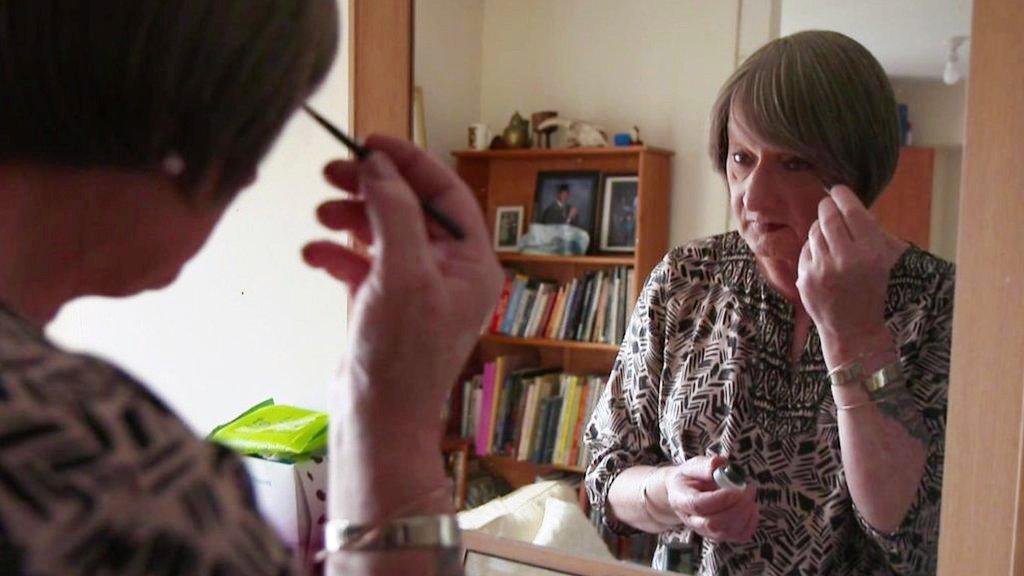Transgender man's mastectomy surgery dubbed 'mutilation'
- Published
Elliot said he has felt like he was different from a young age
A coffee shop has been criticised for sharing a Facebook status in support of a transgender employee's double mastectomy.
Penylan Pantry in Cardiff shared a post to help Elliot Comanescu crowdfund enough money to have his breasts removed privately.
But the shop was criticised by several people on social media for promoting "body mutilation".
Elliot said he had counselling before making the decision to have surgery.
But he was shocked when his bid to go ahead with the operation sparked a backlash on social media.
Some comments referred to Elliot as a woman throughout and told him to "seek psychotherapy" instead.
The Pantry has since deleted the comments, and has posted its support for its 21-year-old employee.
"We stand by Elliot and will continue to support and love him," it said.
"We appreciate that people have different views, however this is not a discussion platform."
Elliott's Story
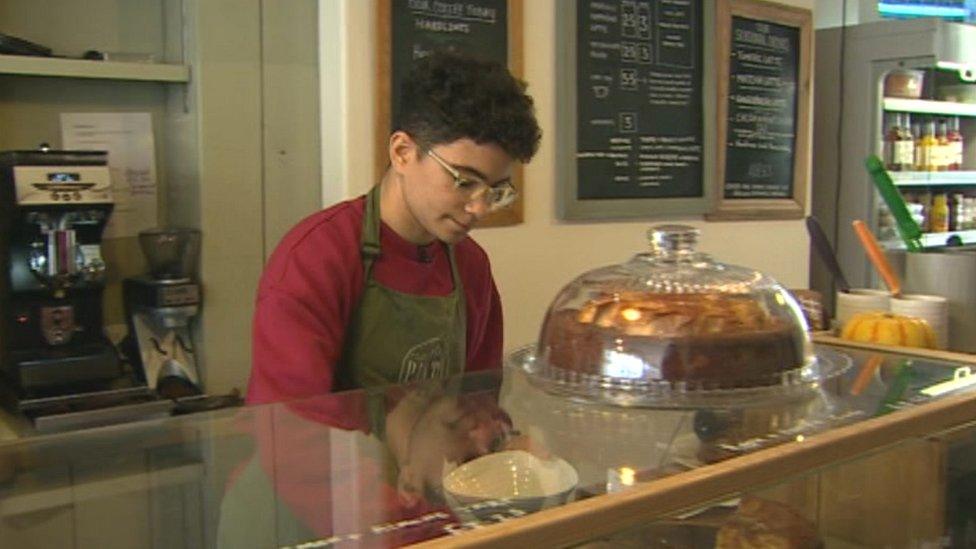
Elliot has been supported by his employers at the coffee shop
Elliot, from Cardiff, said felt like he was different from a young age.
"I remember once being at a family barbecue running around with my top off, and kind of knew somehow or other that I would definitely be a guy when I was older."
At the age of 16 Elliot identified as a transmasculine man, and from the age of 19 he's has been taking testosterone.
After initially waiting on the NHS for his "top surgery" to remove both his breasts, Elliot decided he wanted to have it done privately.
Elliot has been crowdfunding for the double mastectomy since January.
"A double mastectomy would allow me to liberate myself and help me identify as more transmasculine, without people having to second guess that," he added.
He decided to attempt to raise £4,000 of the £6,500 required to go through with the procedure via crowdfunding, and pay the other £2,500 himself.
"I shared the post on the Pantry's Facebook page, with the manager's consent, in order to get more support, so I posted it the day after Transgender Visibility Day," he said.
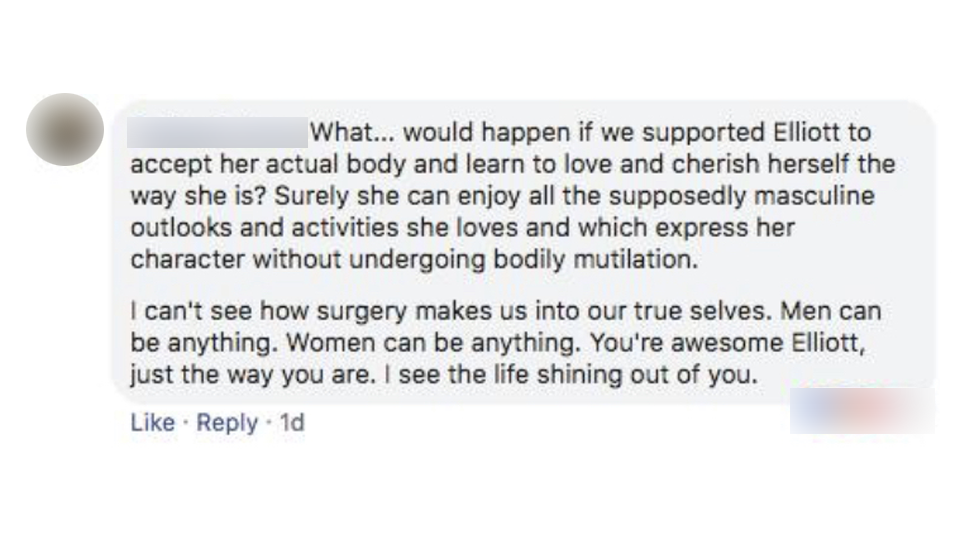
One Facebook comment described the surgery as a form of "gender mutilation"
"It was all positive at first for about a week, and then the negative comments started coming."
Elliot was told he needed "psychotherapy", and that his top surgery was a form of "mutilation".
One comment also described gender therapists as "criminals".
"I just don't understand how the people commenting can have such radical ideologies about trans people," Elliot said.
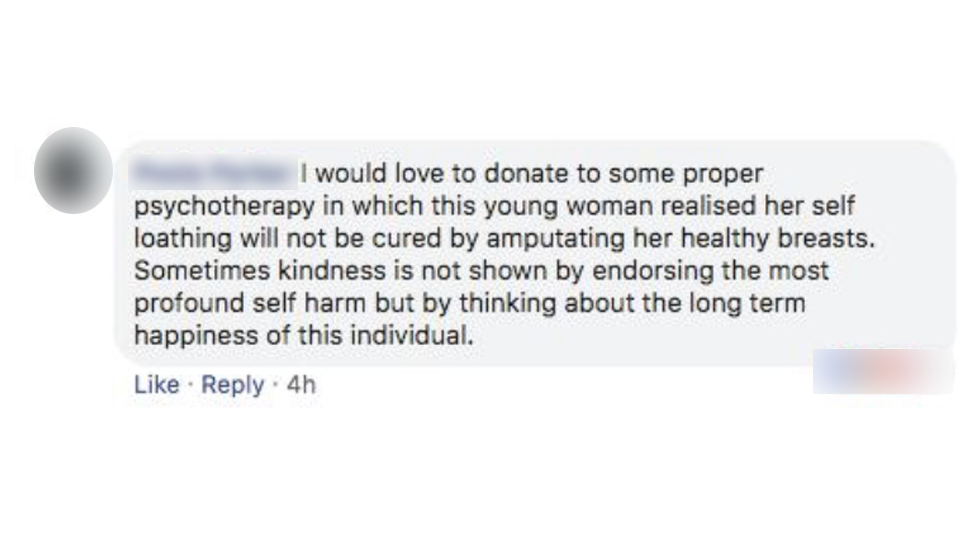
Another Facebook comment suggested that Elliot should receive psychotherapy instead of the procedure

Terminology
Gender - Often expressed in terms of masculinity and femininity, gender is largely culturally determined and is assumed from the sex assigned at birth.
Sex - Assigned to a person on the basis of primary sex characteristics (genitalia) and reproductive functions.
Gender Dysphoria - Used to describe when a person experiences discomfort or distress because there is a mismatch between their sex assigned at birth and their gender identity.
Trans - An umbrella term to describe people whose gender is not the same as, or does not sit comfortably with, the sex they were assigned at birth.
Transitioning - The steps a trans person may take to live in the gender with which they identify. Each person's transition will involve different things. For some this involves medical intervention, such as hormone therapy and surgeries, but not all trans people want or are able to have this.
Transgender Man - A term used to describe someone who is assigned female at birth but identifies and lives as a man.
Source: Stonewall, external

A fight for rights
A debate around transgender issues has made the headlines in Cardiff before.
A protest was held by Pride and the Wales Equality Alliance last April, against a meeting of the group Woman's Place UK, which campaigns on plans to change the law on gender recognition.
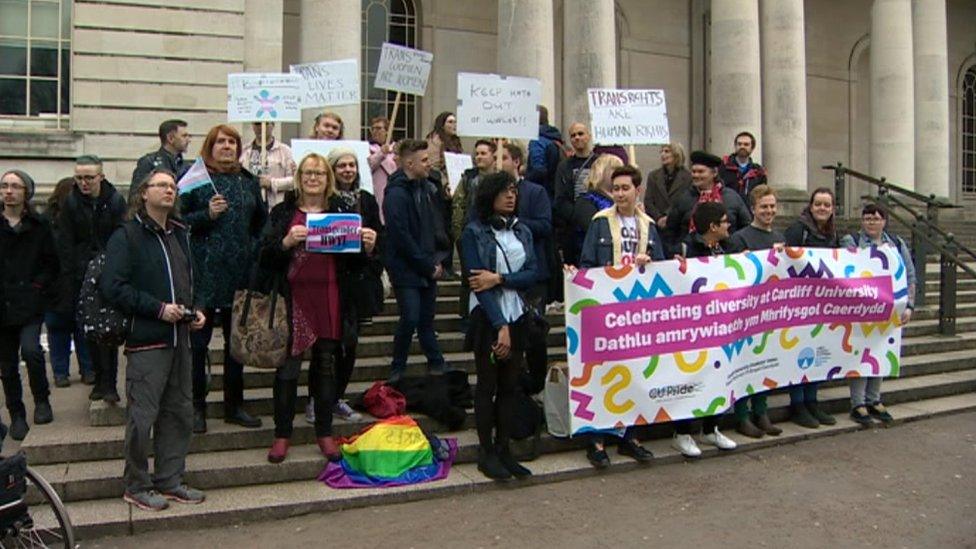
Pride Cymru and the Wales Equality Alliance protested against a meeting of Woman's Place UK in Cardiff last year
The group had originally planned to hold a meeting at the Mercure Hotel in Cardiff, but had to rearrange on the day due to safety concerns.
Jeni Harvey, who spoke at the group's event, explained why some people are concerned about gender reassignment surgery.
Speaking in general about the issue, Ms Harvey said: "There is a rush to surgery and what we actually need to be doing is exploring the reasons as to why young women are experiencing this gender dysphoria," she said.
She added that there was concern surgery was a permanent measure which could lead to the "potential for real regret".
Speaking in general she added: "This surgery is irreversible. If at some point in the future she wants to change her mind there's nothing she can do. Breasts don't grow back."
But Elliot is not worried about the possibility of regret.
"I don't think I would regret it because I've had a lot of counselling and really had to think this through, but if in the future I did decide to de-transition that is also valid," he said.
"It is ultimately my decision to make."
More Referrals
The first Gender Identity clinic is about to open in Wales this September.
Currently people looking to gender transition are sent to a clinic in London, and the number of people referred to that clinic from Wales has nearly trebled in the last two years.
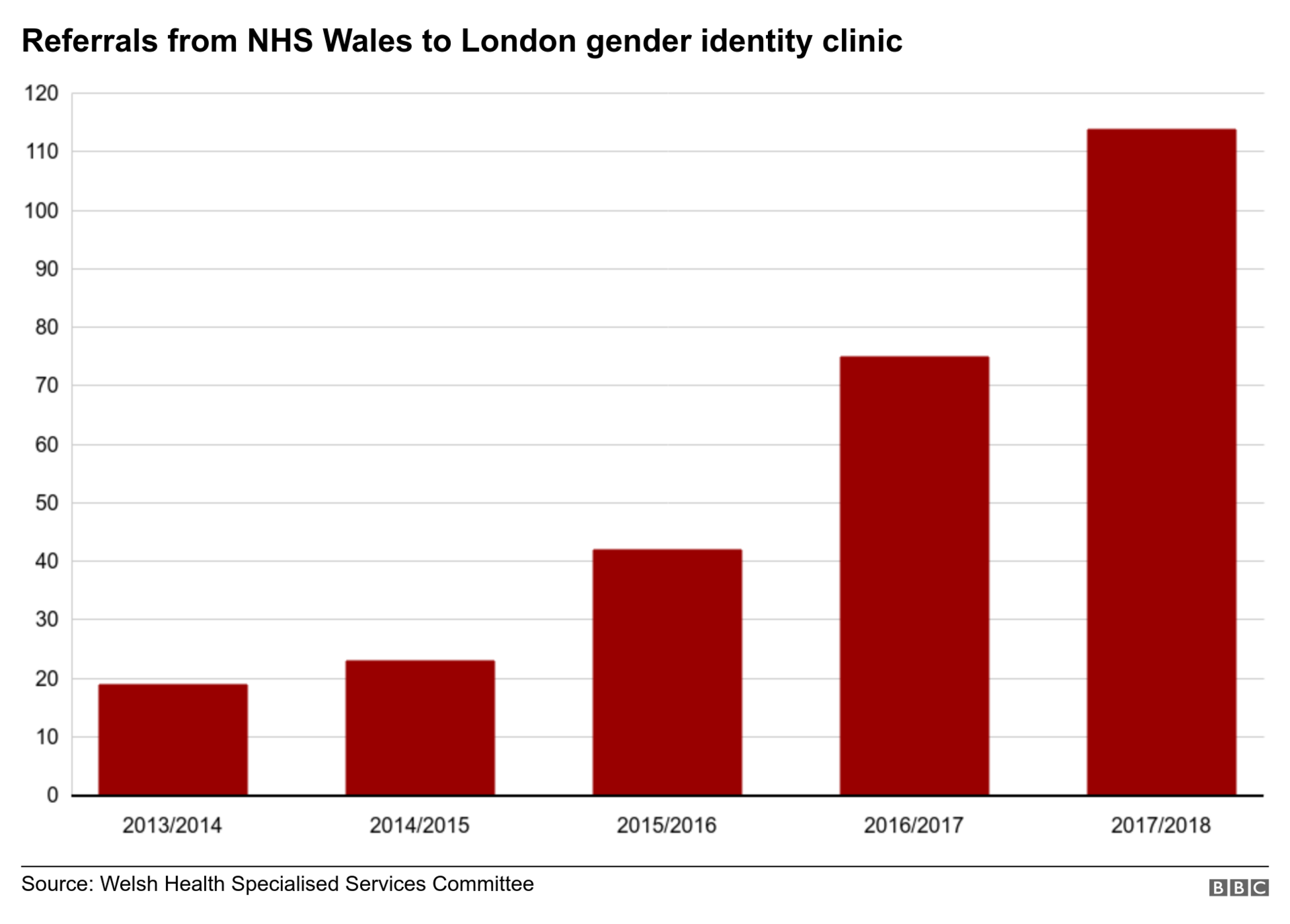
Ms Harvey said: "Young women are living in a society in which they are bombarded constantly by images on how they should look, highly sexualised images on how they should act, and I think it's within this context that we are seeing this rise in young women saying I don't want to identify as a woman."
But the Wales Equality Alliance thinks there are a number of factors in the rise in numbers of people transitioning.
It said: "Some of the factors may be the increased visibility of trans people in society and the media as well as the knowledge that there is support out there for people who are transitioning."
- Published27 June 2019
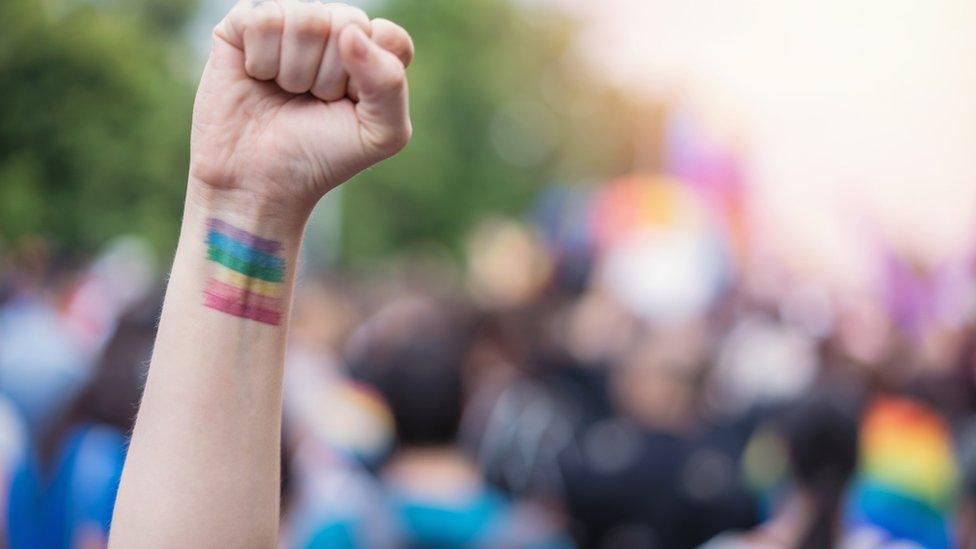
- Published20 May 2019
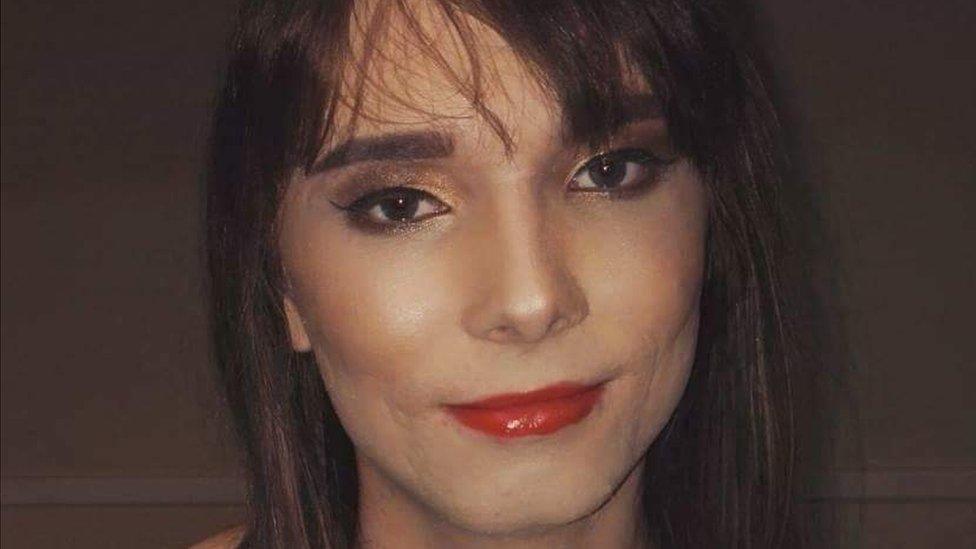
- Published8 July 2019
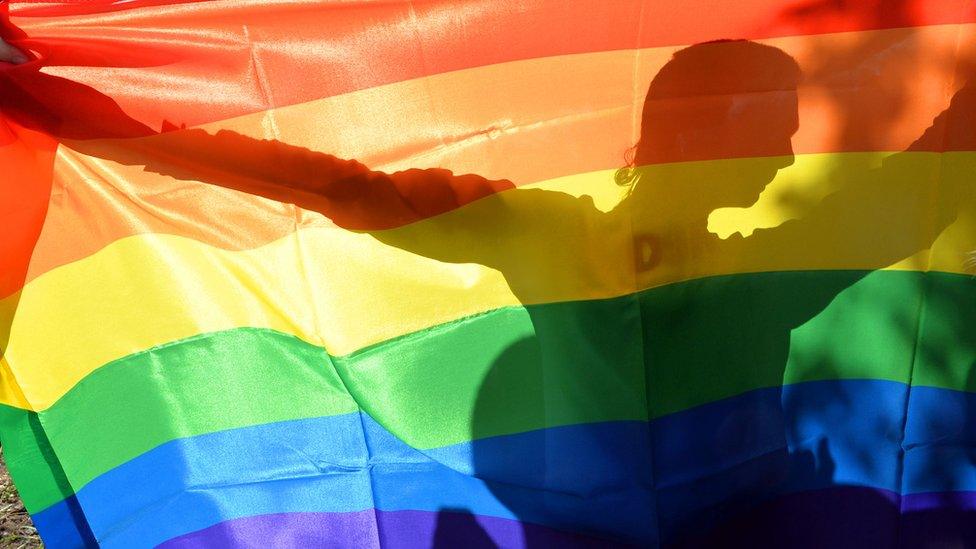
- Published31 March 2019
